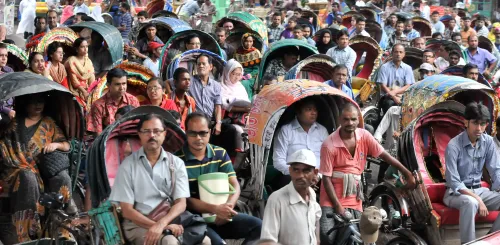Is Bangladesh's turmoil reviving a terror threat on India's border?

Synopsis
Key Takeaways
- The JMB is reviving its activities due to political instability in Bangladesh.
- Indian intelligence agencies are monitoring the JMB's resurgence closely.
- The group is recruiting foot soldiers among refugees and illegal immigrants.
- Cooperation between India and Bangladesh is vital for national security.
- Al-Qaeda's involvement could escalate the threat level significantly.
New Delhi, Aug 6 (NationPress) The Jamaat-ul Mujahideen Bangladesh (JMB), once a formidable terrorist group in Bangladesh, posed significant threats to India’s national security. However, for the last eight years, its activities had significantly diminished, showing no signs of resurgence. With Sheikh Hasina's removal, numerous radical factions have gained traction, resulting in the resurgence of groups like the JMB.
Indian intelligence agencies have raised alarms about a substantial revival of the JMB, which presents a direct threat to the northeastern states and West Bengal.
The resurgence is particularly alarming as the JMB exploits a vast number of refugees and illegal infiltrators as its operatives. This tactic aligns with the agendas of the ISI and Jamaat-e-Islami, facilitating a surge in illegal crossings.
Moreover, the JMB is actively seeking alliances with Al-Qaeda as part of its revival strategy. Al-Qaeda's extensive reach enables a faster dissemination of its ideology, while the JMB primarily focuses on operational ground activities.
Since Muhammad Yunus assumed temporary leadership in Bangladesh, the Jamaat has been manipulating situations under the ISI’s guidance. Numerous ISI officials have visited Bangladesh to coordinate with the leaders of these factions, aiming for a united front among the terrorist groups.
For instance, the ISI is encouraging the JMB to concentrate its efforts on India, joining forces with the Ansarullah Bangla Team (ABT) and Al-Qaeda. Al-Qaeda has shown eagerness to collaborate, recalling their involvement in the 2002 church bombings in Gopalganj and the 2004 attacks on the UK and US embassies.
Focusing on their intentions towards India, the JMB is assembling a robust base of operatives, actively recruiting from camps housing illegal immigrants and Rohingya Muslims fleeing from Bangladesh and Myanmar.
Given the turmoil in Myanmar, the JMB can easily recruit individuals escaping from there. Once they infiltrate India, these recruits are instructed to engage in low-profile jobs in areas predominantly inhabited by Bengali Muslims to avoid detection.
Further instructions emphasize minimal interaction with local residents while conducting their work in smaller industries. However, they are to hold frequent meetings to strategize, ensuring these gatherings occur in discreet locations with smaller groups to evade discovery.
The JMB's presence in India is not unprecedented; the Burdwan blast in 2014 was linked to the group. Investigations revealed that many operatives involved were illegal immigrants, suggesting a similar operational pattern this time, according to intelligence assessments.
Currently, the JMB is capitalizing on the porous India-Bangladesh border in West Bengal and Assam. The vulnerability of this border, coupled with the deteriorating conditions in Bangladesh, facilitates the infiltration of JMB operatives.
To effectively address this challenge, India must seek cooperation from the Bangladeshi government, akin to the collaboration during Sheikh Hasina's tenure. Nonetheless, the current regime under Yunus appears more aligned with Pakistan, resulting in strained relations with India.










